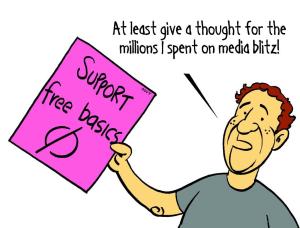
Now coming to the the Scheme which has been grabbing all the attention in the mass media, which includes news and paid correspondence !! Frankly, don’t remember the last time I saw the kind of advertising and media blitzkrieg which Facebook has released on the Indian public to promote “Free Basics”. The past week has been a mixture of multiple full page advertisements in all major newspapers giving us an insight into “what Network Neutrality Activists Won’t Tell You”, “A First Step Towards Digital Equality” and “Support Ganesh: Support Digital Equality”. Some of Facebook’s tactics displayed in full the desperation of the omnipresent social networking website as well as the gullibility of the Indian (atleast online) populace. Mark Zuckerberg has himself become part of the PR overdrive in order to push support for what he genuinely seems to believe should be the next big leap in connectivity in India.
Now lets get two facts straight at the very outset. There is NO DIFFERENCE between “Free Basics” and “Internet,org”. “Internet.org” was a failure because it generated too much unexpected negative publicity for Facebook and the websites/organisations joining the initiative. This led to most of them opting out of the service, which is why Facebook decided to re-christen the programme and to push it through this time they decided to also launch the “Free basics – Digital Equality” campaign in order to generate some public support for the Scheme. So far, it has been an expensive campaign with little to show for it, except for a lot (allegedly 3.2 million as per facebook itself) of virtual verbatim blind click mails and signatures which Facebook claims is the “support” they have received from the Indian online community. [UPDATE: The T.R.A.I. has now stated that it considers these mails/signatures as a valueless opinion poll and are not an adequate response to the questions framed by it.] Secondly, it would be most unfair to not acknowledge the fact that “Free Basics” has the potential to be beneficial to the citizens of India, especially the unconnected parts of the country. However, as I outline below, the Scheme as it’s terms and conditions stand today, are more harmful for internet connectivity in the Country than the ancillary benefits which may accrue.
FACEBOOK CONTROLS EVERYTHING ON FREE BASICS/INTERNET.ORG
It is Facebook which acts as a guardian of the gate who will decide who enters the Free Basics platform and who doesn’t. Frankly, I am not comfortable with one entity exercising such overarching controls over a programme which it aims to spread itself throughout the country, and further throughout the world. Make no mistake, philanthropy aside, there are two major reasons why Facebook actively pursues “Internet.org/Free Basics”:- One, more eyeballs for the advertisements generated on its website as new users sign into Facebook. Second, for the shear amount of data it will generate for analysis through its user-base. Facebook is at the end of the day a business and while it is natural for a business to want to expand its customer base and generate higher revenues/profits, this cannot come at a cost of taking advantage of an individuals lack of literacy or understanding of how expansive the internet really is and attempt to keep him or her confined to select websites which have “conformed” to the standards set by Facebook. In simple terms, Facebook has no right to act as a hand holding teacher and “guide” people through a particular path. People must be allowed to understand that the internet is more than what they will see through “Free Basics” and choose for themselves what they wish to do or see on it, whether it be researching on new farming techniques or even be as voyeuristic as watching porn. Don’t get me wrong. Am sure the “Ganesh” in the Full page newspaper ads must have genuinely benefited, but did he have any idea that what he saw was just perhaps two percent of the accessible internet ??
Let me substantiate this with a real life example of what is happening in poorer parts of the world. Millions of Facebook users have no idea they’re using the internet !! A research survey, with a special focus on Indonesia and Nigeria where surveys were carried out, displays how people were not aware about the internet, but yet used to directly access Facebook, to the extent that in opinion polls a higher percentage would state that they had accessed Facebook, but a lower percentage would state that they had accessed the internet !! And do note, the article discussing the findings is dated 9th February, 2015 and states that the trends were noticed three years ago, when “Internet.org” was merely a concept in discussion and roll out had not even started. Imagine what internet connectivity could become with “Internet.org/Free Basics” implementation at its peak ?!?!
THE PROBLEM IS NOT PRESENT ABUSE. IT IS POTENTIAL FOR ABUSE
As of now, Facebook has stated that it has never rejected an Application which fulfill’s the qualifying parameters for developers on “Internet.org/Free Basics”. That’s fine for now, but what about the future?? Is Facebook willing to give a commitment that the “parameters” will always be broad and will never be to the detriment of a genuinely useful Application for the people?? No it won’t, not because it may or may not want to, but because it can’t !! The engineers at Facebook are not oracles to see the future, and what can be good or not got good or worthy or not worthy to be accessed by the Indian internet community cannot be subject to parameters laid down at a single given point of time, no matter how broad they may be. This will always be subject to the ever changing values of any given society and furthermore, to the ever important evolution of technology which in today’s furiously paced world is not just extremely hard, but downright impossible to predict. Anybody could come up with a technology or programme to give Facebook a run for its money. Can Facebook give an absolute guarantee in writing that such an Application/Programme would be allowed on Free basics?? I highly doubt it. (You can already see a potential for such abuse relating to an upstart Facebook rival “Tsu.co”)
One look at the Reliance Free Basics website for details on the websites which as of today on the platform shows that only thirty one websites/Applications are part of the Free services available under “Free Basics”. The only social networking websites, no guesses required here, are Facebook and Facebook Messenger. Over and above this, the only search portal was “Bing”, the only Jobs portal was “BabaJob” (I hadn’t even heard or read of them before seeing them here) and the only shopping website was “OLX”. The result is a potentially serious anti-competitive scenario over the internet resulting
THE INTERNET IS NOT A BUSINESS.
David Kirkpatrick, in a Linkedin Pulse Blog Post, is one of the few who has come out in defence of Facebook/Free Basics. He opined a marxist argument questioning in bold words “Do all these elite and generally upper-class and affluent Indian pundits, professors and anti-corporate activists have a better way to get many millions of less-privileged Indians onto the Internet?” and further goes on declare as follows:
“But in my view Free Basics is a fine example of what many call “doing well by doing good.” There is nothing wrong with being in business. There is nothing wrong with a business trying to acquire new customers. There is nothing wrong with offering something for free that you might charge for later. And however ruefully people elsewhere sometimes view it, there’s nothing wrong with Facebook being an American company operating successfully around the world.
Do all these elite and generally upper-class and affluent Indian pundits, professors and anti-corporate activists have a better way to get many millions of less-privileged Indians onto the Internet? If they don’t, their arguments are hollow. It’s hard to understand why Facebook shouldn’t be able to subsidize new customers’ entrance into the contemporary world of information power. For the poor, the opponents’ arguments add up to literally nothing. That’s what those people would get without Free Basics. But then, that’s what such people have had in India for millenia.
As I have already acknowledged, I too believe that Mark Zuckerberg is pursuing his endeavour with such zeal partly due to the obvious enormous potential advantage it can generate in favour of Facebook as well as a sense of idealism and an intent to do some good. But Kirkpatrick misses the point. THE INTERNET IS NOT A BUSINESS. It is a resource. You may use the internet to build a profitable business, but one cannot be allowed to make a business of the internet itself. The internet is a resource which is first and foremost, in the custody of the State which acts as a custodian of the resource on behalf of the citizens of that State. Which is why you have spectrum auctions. The Central Government, which is the custodian and owner of all spectrum in the Country, effectively leases bandwiths in different circles to different businesses which can harness the spectrum to provide internet services and/or use the internet itself. What Free Basics aims to do is to make a business out of the Internet itself. by allowing access to some applications while denying access to others (on technical grounds, if not more nefarious reasons), it effectively seeks to control what you consider as “The Internet”. Furthermore, it is important to note that Facebook itself has acknowledged that it is open to advertisement on the Free Basics platform to generate revenue in the future.
LACK OF CONNECTIVITY IN INDIA IS BECAUSE OF LACK OF INFRASTRUCTURE. NOT LACK OF FREE BASICS
The lack of connectivity in India is not because of lack of money. If a man or a woman can afford a smartphone, it’s safe to presume that he or she can also afford a 3G/4G pack along with it or be able to access wi-fi from some point, either at home or work or both. The problem of connectivity has more to with lack of infrastructure, both in rural and urban areas, and “Free Basics” does nothing to solve this. It does not help to build mobile towers or help in contributing additional spectrum for public use. All that it does is allow access to some websites for free. But what would be the point to allowing free access to websites on the internet if they cannot get the signal/bars to access the internet in the first place ?!?! If anything, it has the potential to add to the burden of the overused and under developed mobile connectivity services.
CONCLUSION
To conclude:
 (R. Prasad)
(R. Prasad)
Facebook may have just lost some serious love and respect in one of its biggest markets.
P.S. : HAPPY NEW YEAR. 🙂





